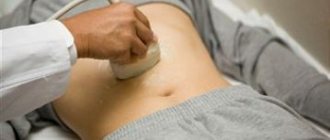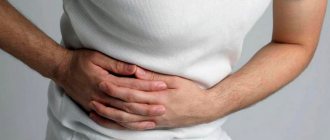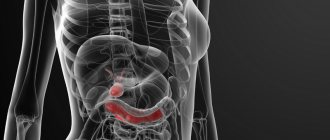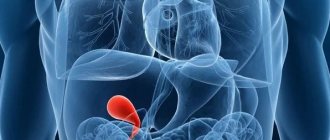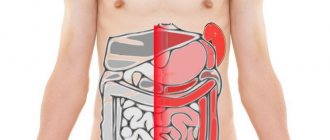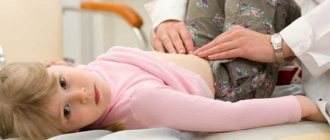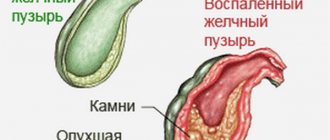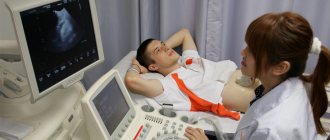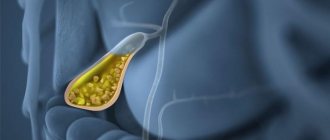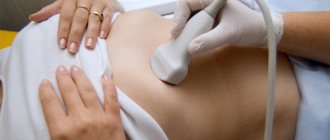For any changes in the functioning of the biliary system organs, a visit to a specialist is necessary. If the correct therapeutic effect is absent, this is fraught with the appearance of not only unpleasant symptoms, but also the development of various dangerous consequences and complications.
Gallbladder dyscholia is a pathological change in the composition of bile. This problem can be triggered by various diseases and poor lifestyle choices; in particular, with an unbalanced diet and poor nutrition, the first symptoms of dyscholia appear.
What is dyscholia
The term gallbladder dyscholia refers to pathological changes in the composition and characteristics of bile secretion. In this case, its concentration is many times higher than the level in liver cells. Normally, bile contains substances such as bilirubin, cholesterol, acids and other compounds. If the concentration of cholesterol increases several times, this substance settles on the walls of the organ; this is a positive environment for the further formation of stones.
Various diseases can cause high cholesterol: diabetes, obesity, and genetic predisposition. Also, such a pathology may be caused by a sharp increase in bilirubin concentration due to anemia or under the influence of increased activity of pathogenic microorganisms.
In what cases may surgical intervention be required?
If drug treatment of the disease turns out to be ineffective, then it will not be possible to cope without surgical intervention. Doctors will be able to perform an operation called cholecystectomy. The fact is that over time, dyscholia of the gallbladder can lead to the formation of stones, and in this case there is nothing left but to remove the organ completely.
With modern technologies, such operations are carried out with minimal risk to human health, and the incision site can hardly be seen. The operation does not last long. As a rule, an hour is enough. Of course, in the future the patient will most likely have to be even more careful about his health and adhere to a certain diet throughout his life.
Symptoms and diagnosis
If such a pathology is present, diagnostic methods and treatment are selected by the doctor. Violation of the composition of bile is accompanied by certain clinical manifestations that should not be ignored. All stages of the development of the disease have their own characteristic echo signs. If gallbladder dyscholia occurs, its symptoms are as follows:
- pain in the right hypochondrium, they can radiate to the diseased organ, to the epigastric region, even to the left side and the navel,
- symptoms of a dyspeptic nature - bitterness in the mouth, a feeling of squeezing or heaviness on the right, attacks of nausea or even vomiting,
- increased gas formation, difficulties with emptying the intestinal tract.
This type of gallbladder disease requires consultation with a doctor. Methods for diagnosing and treating gallstones are prescribed depending on the complaints, anamnestic data and general condition of the patient. For diagnosis, ultrasound examination of the abdominal organs, general and biochemical analysis of blood fluid, general urine analysis, gastroscopy are prescribed, and the level of cholesterol in the blood is determined using laboratory tests.
Why is bile needed in the human body?
Bile is directly involved in digestion. Therefore, it performs several functions simultaneously:
- Breaks down fats and prevents cholesterol from being absorbed in the intestines.
- Activates the production of enzymes that allow the absorption of proteins.
- Stimulates the synthesis of pancreatic enzymes.
- Regulates intestinal motility.
- Stimulates the formation of mucus in the intestines.
- Does not allow gastric juice to act aggressively on the stomach.
Having a full understanding of what it is - gallbladder dyscholia, treatment should be timely and comprehensive. The faster a person can respond, the easier and safer the therapy will be.
Signs and causes of pathology
Signs of dyscholia and the causes of changes in the composition of bile are closely related. Since the symptoms and their severity will directly depend on which particular compound increases its concentration. The main reasons include:
- inadequate or unbalanced nutrition,
- genetic predisposition,
- disturbances in metabolic processes in the body,
- pathological processes in the microcirculation of bile from the liver,
- maintaining a sedentary lifestyle,
- hypotensive disease,
- neurogenic disorders,
- helminth infections,
- pathologies of the enocrine system - lack of menstruation, lack of sexual activity, excessive body weight.
Means for normalizing the functioning of the gallbladder
- To cleanse the bile ducts, you should take herbal choleretic drugs - Flamin, Cholesas and others. The dosage and course of administration must be clarified with the treating doctor;
- To restore the functions of the biliary system, synthetic drugs Atropine, No-shpa or Drotaverine will be effective. The doses taken should be indicated by a specialist after the examination;
Read also: How do liver stones form without a gallbladder?
- Treatment with traditional medicine involves taking tinctures and decoctions of medicinal herbs and plants. The most popular treatment for dyscholia in adults is sauerkraut juice or strawberry tea;
- The functioning of the gallbladder can be improved by taking alkaline mineral waters and performing tubing under the supervision of a doctor;
- Rosehip decoction will increase immunity and improve the general condition of the patient.
In children, disorders in the composition of bile are treated with the drug Gepabene. This broad-spectrum medicine is used in the treatment of intestinal disorders and problems in the biliary system. With regular use, the composition of bile improves and unpleasant symptoms are eliminated. The course of treatment is about 2 months. The success of therapy is confirmed by ultrasound examinations.
YouTube responded with an error: Daily Limit Exceeded. The quota will be reset at midnight Pacific Time (PT). You may monitor your quota usage and adjust limits in the API Console: https://console.developers.google.com/apis/api/youtube.googleapis.com/quotas?project=726317716695
What are the causes of poor bile flow?
The causes of gallbladder dyscholia are also associated with the fact that certain changes occur in the biliary organs. The reasons for the stagnant process in the gallbladder lie in the following exogenous and endogenous factors:
- consumption of harmful products, as a result of which biliary disease develops,
- constant sedentary work, no load,
- frequent overeating
- chronic inflammatory processes of the digestive system,
- infectious and inflammatory processes in the liver.
Features of the development and treatment of JP in children
Dycholia can occur at any age. The causes of gallbladder dysfunction in children are approximately the same as in adults:
- nutritional and metabolic disorders;
- parasites;
- infectious diseases;
- congenital pathologies.
Children, especially young ones, do not always understand what hurts them. If a child complains of abdominal pain, flatulence, stool problems and nausea, a full diagnosis and ultrasound of the digestive tract is performed.
If abnormalities in the functioning of the gallbladder are detected, safe medications are prescribed. Many doctors recommend Gepabene as the most effective herbal remedy based on milk thistle. The course of its administration is 1-2 months.
Decoctions of medicinal plants - yarrow, immortelle, corn silk, rose hips, angelica root - are effective in the treatment of liver and gall bladder diseases. Drinks promote the outflow of bile and increase the tone of the organ. Do not forget about following a diet and moderate physical activity.
To prevent dyscholia, you first need to adhere to proper nutrition. Not only during illness, but also after recovery, it is worth following a light diet. It will help to avoid other disorders in the digestive system.
Medications
Therapy for dyscholia is prescribed only by a doctor after a preliminary examination. Treatment of the biliary tract, cholecystitis and intestinal tract is carried out using medications and traditional medicine. Choleretic drugs are used - allochol, holosas, ursolac and others. These preparations contain herbal components. These medications are prescribed three times a day, half an hour before the main meal.
Hepatoprotectors are also used - Karsil, Essentiale, Essliver, Enerliv.
The listed drugs are approved for use during pregnancy and childhood.
Treatment methods
Treatment of gallbladder dyscholia should be comprehensive: diet therapy, medications, gentle physical activity. This is the only way to keep the body in good shape and speed up recovery.
The patient must follow a diet, take medications and perform special physical exercises
The patient must follow a diet, eat food about 6 times a day in small portions. It is worth excluding fried, spicy, fatty foods from your diet.
In addition, it is recommended to consume wheat bran starting from 5 g, gradually increasing the dose to 30 g. The product is poured with boiling water, left for a few seconds, after which the water is drained. Bran can be added to soups, porridges, and mixed with fermented milk products. They have a beneficial effect on the body, reducing cholesterol levels. The product is consumed for 1 month during the treatment of JP. In addition, steamed bran is recommended to be included in the diet to prevent dyscholia.
The patient should drink alkaline mineral water, a decoction of rose hips, which contains a lot of ascorbic acid.
The patient should avoid stress, eat right, and rest.
To normalize the functionality of the gallbladder during dyscholia, it is recommended to take the following medications:
- Choleretic agents based on herbal components are used to clean the bile ducts (Holosas, Flamin, etc.).
- For acute pain, synthetic medications are used: No-Shpu, Atropine, Drotaverine. The dosage of the antispasmodic is determined by the attending physician.
- Choleric agents based on herbal or synthetic components increase the production of liver secretions and dilute it. They help with stagnation of bile, help eliminate excess gases from the intestines during flatulence, and normalize stool.
- With the help of hydrocholeric agents, the volume of secretion increases due to water, it becomes less viscous, and is eliminated faster and easier.
If medications do not have the desired effect and stones form in the gallbladder or bile ducts, then a surgical treatment method (cholecystectomy) is used.
There are different methods, but laparoscopy is the most effective. This is a minimally invasive method of surgical treatment, after which the patient recovers faster.
In addition, the patient is recommended to perform special exercises that strengthen the abdominal muscles and massage the internal organs. Thanks to physical therapy, blood circulation is normalized, the discharge of liver secretions is improved, and intestinal motility is normalized. The doctor will advise each patient individually in more detail about the set of exercises.
Prognosis for recovery
If you follow all medical prescriptions and proper nutrition, you can reduce the concentration of cholesterol and bilirubin within one month. After this, observation by the treating specialist continues.
Every 12 months it is necessary to carry out planned instrumental and laboratory diagnostic measures. It is also important to ensure that both adults and children do not experience strong emotional overload, since exacerbation of pathology can occur due to neurogenic disorders.
Rules to follow when dealing with dyscholia
A patient who has been diagnosed with gallbladder dyscholia must remember that he is unlikely to achieve much success in treatment if he does not adhere to simple rules:
- The patient must eat properly.
- Follow a certain diet.
- Monitor the breaks between meals and develop a separate regime for yourself.
- Eliminate a number of foods that can be harmful.
- Don't worry and don't get stressed.
- At the first manifestations of the disease, get examined.
- Once a year, be sure to do an ultrasound of the abdominal organs for the sake of prevention.
If you follow these simple rules, the prognosis for recovery will be favorable.
Symptoms that may accompany JP
Symptoms include:
- pain (dull, more on the right, present after eating food, especially fatty and spicy);
- dyspeptic disorders (nausea, heartburn, stool upset);
- weakness, loss of appetite.
Sometimes there may be no symptoms.
Consequences of impaired bile formation
